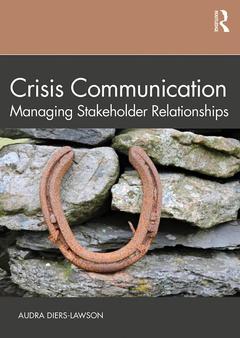Crisis Communication Managing Stakeholder Relationships
Auteur : Diers-Lawson Audra

Crises come in many shapes and sizes, including media blunders, social media activism, extortion, product tampering, security issues, natural disasters, accidents, and negligence ? just to name a few. For organizations, crises are pervasive, challenging, and catastrophic, as well as opportunities for organizations to thrive and emerge stronger.
Despite the proliferation of research and books related to crisis communication, the voice that is often lost is that of the stakeholder. Yet, as both a public relations and management function, stakeholders are central to the success and failure of organizations responding to and managing crises in a cross-platform and global environment. This core textbook provides a comprehensive and research-driven introduction to crisis communication, critical factors influencing crisis response, and what we know about predicting stakeholder responses to crises. Incorporated into each chapter are global case studies, ethical challenges, and practitioner considerations. Online resources include an extensive set of multimedia materials ranging from podcast mini-lectures to in-class exercises, and simulation-based activities for skills development (https://audralawson.com/resources/crisis-communication-managing-stakeholder-relationships/).
Demonstrating the connection between theory, decision-making, and strategy development in a crisis context, this is a vital text for advanced undergraduate and postgraduate students of Communications, Public Relations, Marketing, and Strategic Management.
Part 1: Crisis communication and the stakeholder relationship management perspective. 1. Introducing crisis communication as a field of practice. 2. Situating crisis communication within the fields of public relations and management. 3. The stakeholder relationship management perspective on crisis communication. Part 2: Issue factors: Evaluating stakeholders, risks, and crisis types. 4. The importance of managing complex and changing organizational environments. 5. From friends to frenemies: Mapping an organization’s stakeholders. 6. Playing the blame game to classify types. Part 3: Internal stakeholders and organizational factors: Evaluating the organization’s crisis capacity. 7. Defining crisis capacity in a modern environment. 8. Building crisis capacity from the inside out. 9. The leadership challenge for organizations in crisis. Part 4: Stakeholder factors: Shifting from the inside out. 10. The missing link of stakeholder attitudes to understand crisis communication. 11. Issue-related attitudes influencing stakeholder reactions to crises. 12. Organization-related attitudes influencing stakeholder reactions to crises. Part 5: Message factors: Crisis response that focuses on stakeholder needs. 13. The realities of crisis response in multi-platform, multi-actor environments. 14. One size seldom fits all: A taxonomy of crisis response tactics. 15. Comparing theories of crisis response. 16. Strategically planning crisis response messages. Part 6: Shaping crisis outcomes: What do crises mean for organizations? 17. Agenda setting: The intersection of multi-actor environments and media engagement during crises. 18. Learning their lessons? Crisis outcomes and crisis-driven organizational change. 19. Measuring behavioral outcomes to crises.
Audra Diers-Lawson is a Senior Lecturer at Leeds Beckett University, United Kingdom. She serves as chair of the Crisis Communication Division of the European Communication Research and Education Association (ECREA) and sits on several journal editorial boards with recent publications on topics like consumer trust, intercultural crisis communication, crisis atonement, whistleblowing, and stakeholder anger at organizations in crisis.
Date de parution : 10-2019
17.4x24.6 cm
Date de parution : 10-2019
17.4x24.6 cm
Thèmes de Crisis Communication :
Mots-clés :
Crisis Communication; Strategy; Public Relations; Business Crisis; Risk Analysis; Crisis Plan; Crisis Management; Risk Communication; Stakeholder Relationships; Brand Management; Disaster; Organisational Communication; Organizational Communication; crisis communication research; crisis theory; EPPM; Managing Stakeholder Relationships; Violating; Crisis Response; Face To Face; Word Of Mouth; Crisis Response Strategies; Blame Attribution; Crisis Capacity; Counter Brand; Oil And Gas Industry; Stakeholder Attitudes; Crisis Response Messages; Issues Management Process; Effective Crisis Response; Stem Field; Stakeholder Reactions; Competing Stakeholder Interests; Reputation Crisis; Initial Crisis Response; Crisis Communication Literature; Stakeholder Evaluations; Crisis Management Perspective



